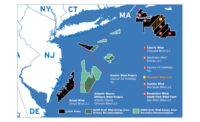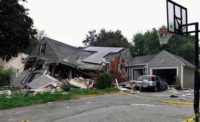Safety
Feds Tighten Leash On Embattled Massachusetts Transit Agency
The MBTA filed a required safety plan with federal regulators for dangerous repair work

The MBTA submitted a four-part plan with the Federal Transit Administration after a rash of near miss accidents and an incident that left a worker seriously injured.
Photo courtesy of the MBTA via Facebook
The Massachusetts Bay Transportation Authority (MBTA) met an April 24 deadline to file a safety plan with federal regulators for repair work in dangerous right-of-way zones following a series of close calls involving track workers, a spokesperson for the agency confirmed.
The embattled transit agency was on the hook to submit a four-part plan with the Federal Transit Administration (FTA)—or face having to shut down all track repair work—in the wake of five near-misses in March and April involving track workers and trains, and a sixth incident that left a worker seriously injured.
The MBTA was also required to do analysis for all rail lines on how many worker crews can be safely granted access and monitored at any point in time. The plan must all address “lessons learned,” as well as “radio limitations” and “staffing and hours of service limitations."
Perhaps tellingly for the understaffed agency, which is looking to fill hundreds of jobs, the FTA is mandating that the T also examine “task saturation” involving the agency’s staff and “increased ROW (right of way) access requests made and granted while managing normal operations and other activities.”
MBTA workers that the FTA is particularly concerned about in terms of being forced to handle too much work at once include “dispatchers, Engineering & Maintenance department scheduling coordinators, operations superintendents, night trackmasters, operations construction supervisory personnel, flaggers, crew forepersons, and motorpersons.”
The series of close calls and the FTA’s intervention also has major ramifications for the private sector contractors the MBTA relies upon to do repairs, maintenance, and other projects, a group that includes Middlesex Corp. and Barletta Heavy Division.
The FTA launched a major safety probe of the MBTA following a series of collisions, derailments and other accidents, including one in which a passenger was dragged to his death after the door of a subway car closed on his arm as he attempted to exit.
Brian Kane, executive director of the MBTA advisory board, said the increase in work on track repair and maintenance, combined with the loss of experienced dispatchers, operators and other long-time employees at the agency over the past few years, may have contributed to the conditions that led to the close calls.
By its very nature, there is a tension when doing track repairs and work between maintaining safety standards and the pressure to get the work done as quickly as possible, especially given the disruption to subway service and schedules.
“The good news is that nobody was hurt or killed—that means some of the safety protocols worked, but clearly it should never have gotten to that point,” Kane said.
The “FTA remains deeply concerned regarding MBTA’s implementation of its right of way (ROW) access procedures and practices,” wrote Joe DeLorenzo, an associate administrator and chief safety officer with the FTA. “Given recent events … FTA finds that a combination of unsafe conditions and practices exist such that there is a substantial risk of death or personal injury.”
The close calls come as the MBTA ramps up work on track repairs and maintenance in a bid to, among other things, eliminate “slow zones” where trains are forced to go at below routine speeds, causing chronic delays and frustrating passengers.
The MBTA’s new general manager, Phillip Eng, announced plans last week to speed up repairs on the Blue Line in order to eliminate slow zones there by November.
In a bid to ramp up repairs, the MBTA has authorized spending as much as an additional $72 million for track repairs over the next two years, and recently went out to bid to seek out contractors for the work.
“FTA Special Directive 22-8 requires the MBTA to take corrective action concerning deferred track maintenance,” said Joe Pesaturo, a spokesperson for the agency, in an email. “These contracts will provide additional resources to perform the work to address deferred track maintenance across the system.”
In addition to the safety plan submitted on April 24, the T has other upcoming weekly deadlines to file with the FTA additional safety plans and new rules to implement them.
Each morning before 5 a.m., the MBTA also has to send copies of all right-of-way access forms to both the FTA and the state Dept. of Public Utilities showing “access granted to work crews, by line, in effect for the 24-hour period beginning with the start of revenue service, that includes name, badge number, access location start point and end point, and associated access start and end times.”
In addition, the T must submit a “work site hazards” assessments each day before 5 a.m. with both agencies.
The ongoing federal oversight of the MBTA comes as Gov. Maura Healey beefs up oversight of the struggling transit authority. The governor on April 24 appointed Patrick Lavin, former safety chief for Washington, D.C.’s and former operations and safety chief for New York City Transit, to be the Massachusetts Dept. of Transportation’s first ever chief safety officer.
Lavin will report directly to the state transportation secretary and to Eng.



